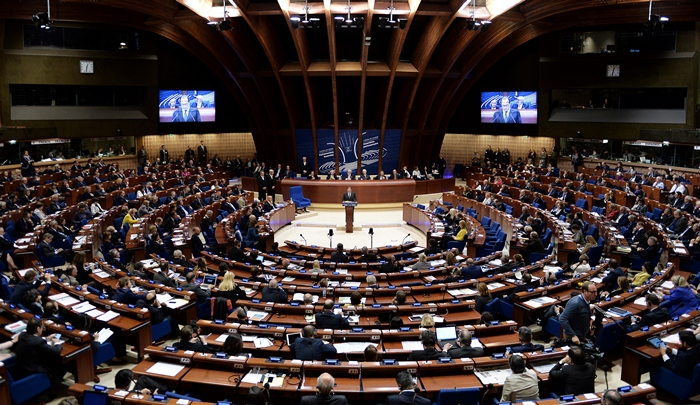Bünyamin Tekin
The Parliamentary Assembly of the Council of Europe (PACE) recently adopted a resolution urging Turkey to comply with the judgments of the European Court of Human Rights (ECtHR) and calling for the immediate release of Osman Kavala, a Turkish philanthropist and businessman. The resolution has sparked discussions on its potential impact and the efficacy of targeted sanctions. Eleonora Mongelli, vice president of the Italian Federation for Human Rights (FIDU), and Dr. Emre Turkut, an expert on international human rights law, shared their insights with Turkish Minute.
The resolution was adopted during the fourth part-session of 2023 by the Committee on Legal Affairs and Human Rights, with PACE member Petra Bayr from Austria serving as the rapporteur.
The resolution calls for engagement with Turkish authorities at the “highest levels” to secure the immediate release of jailed Turkish philanthropist Kavala. In addition it presses for urgent action to bolster the rule of law and human rights protection in Turkey.
Most notably, PACE suggests applying “Magnitsky legislation” or other legal means to impose targeted sanctions on Turkish officials. These officials include prosecutors and judges who have played a role in the “unlawful and arbitrary deprivation of liberty” of Kavala.
Initially, the draft resolution by PACE called for targeted sanctions on a broad range of Turkish officials involved in the unlawful imprisonment of Kavala and other political prisoners. This encompassed police officers, prison personnel, judges and prosecutors. However, an oral amendment, approved by a simple majority, narrowed down the sanctions to only target judges and prosecutors involved in the continued imprisonment of Kavala.
When asked about the resolution’s narrowed focus solely on judges and prosecutors involved solely in Kavala’s case, Dr. Turkut raised concerns, stating, “It would be reasonable to be skeptical about narrowing the focus to a single case, to that of Osman Kavala since Turkey has thousands of political prisoners beyond Kavala.” He emphasized that many Turkish officials may have contributed to their wrongful detentions and convictions.

“However, when we examine the specific details of the Kavala case [a human rights activist imprisoned arbitrarily on ulterior political motives – violations of Article 5 and Article 18 in his ECtHR case], we find a clear basis for sanctions that target judges and prosecutors. If there were claims of torture, it would be appropriate to extend these sanctions to other officials, such as prison administrators, guards and police officers involved in the case,” Turkut said.
Turkey has refused to release Kavala despite a 2019 European Court of Human Rights ruling that found his detention was in pursuance of an “ulterior motive,” that of silencing him as a human rights defender. The non-implementation of the ruling prompted the CoE Committee of Ministers to launch an infringement procedure against Turkey in February 2022, which is still ongoing.
“The narrowed focus signifies a valid and specific concern about the case of Osman Kavala. It conveys a strong message by PACE as they are particularly alarmed by the actions of Turkish judges and prosecutors due to their contribution to the judicial farce in Kavala’s case and believe that they must be held accountable. I believe this decision is clearly justified as Kavala has been imprisoned arbitrarily for the past 4 years despite a clear ECtHR judgment and the infringement proceedings initiated by the CoE Committee of Ministers in 2022. Focusing on the Kavala case may lead to increased scrutiny and international pressure, which can help secure Kavala’s release,” Turkut said.

This was also the case for FIDU Vice President Mongelli. “It represents a significant step forward in the right direction,” Mongelli said. She believes this action, even in its limited scope, will send a strong signal to Turkish authorities and strengthen the enforcement of ECtHR decisions.
Mongelli alluded to a call made in December 2020 by FIDU and other organizations such as The Arrested Lawyers Initiative and the International Bar Association’s Human Rights Institute, which urged the European Union and its member countries to impose sanctions on Turkish officials who are accountable for political trials and the unjust detention of numerous individuals.
“After three years, PACE adopted a resolution to make a similar call. I’m confident that this action can exert significant pressure on the Turkish government,” Mongelli added.
Mongelli sees the adopted amendment as reasonable as it excludes officials who do not have the power to release Kavala.
Dr. Turkut believes the resolution is part of a broader strategy of CoE institutions towards Turkey. “As things stand, we can clearly see there is willingness to resort to both legal and political tools to change Turkey’s course, including the use of sanctions,” he said.
“As you might recall, PACE reopened the full monitoring procedure against Turkey in 2017 due to ‘serious concerns’ about respect for human rights, democracy and the rule of law in the country. In 2022 the Committee of Ministers of the Council of Europe decided to launch infringement proceedings against Turkey due to its refusal to implement the Kavala judgment. The Demirtaş and Yalçınkaya judgments might also follow,” Turkut said.
The ECtHR on Sept. 26 delivered its ruling on Yüksel Yalçınkaya, a former teacher convicted of Gülen links due to his alleged use of a mobile application, his bank account and labor union membership. The court concluded that Yalçınkaya’s conviction violated several legal principles enshrined in the European Convention on Human Rights: the right to a fair trial, the principle of no crime without law and the right to association.
The Strasbourg court also criticized Turkey’s widespread use as evidence of the mobile messaging app ByLock as broad and arbitrary, lacking necessary safeguards for a fair trial. Additionally, the court pointed out significant procedural deficiencies in Yalçınkaya’s trial, including not granting him access to evidence or allowing the independent examination of data.
Turkey has famously refused to implement ECtHR orders for the release of Kavala and Kurdish politician Selahattin Demirtaş. But the recent Yalçınkaya judgment comes as a stark departure from such prior cases, which focused primarily on detention decisions, addressing the merits of the conviction instead.
“The ECtHR is becoming increasingly critical in the cases coming from Turkey – the finding of systemic problems in the Turkish judiciary’s handling of ByLock evidence in the case of Yalçınkaya provides the most recent striking example in this regard. So I think the CoE institutions are forming a much more coordinated approach and response to the serious rule of law situation in Turkey,” Turkut stated.
Both experts were asked their opinions about the use of targeted sanctions as a tool for promoting human rights. Mongelli, an active participant in the global campaign based on the Global Magnitsky Act, said well-targeted sanctions can significantly enhance the toolbox for human rights policies.
“However, it’s important to stress that targeted sanctions cannot be perceived as a last-resort measure. They must be a rapid and effective response from the international community to combat such crimes, and they need to be implemented with determination and coordination. So in my opinion, if the EU adopts such measures, they will definitely be a deterrent,” Mongelli stated.
“The mere fact of a public debate on sanctions can influence the conduct of individuals, including Turkish judges and prosecutors involved in human rights violations,” she said.
Dr. Turkut acknowledged that sanctions can be counterproductive but argued that much depends on their design and context.
“There is a substantial body of research on sanctions arguing that they are counterproductive and do not lead to any positive or noticeable effects. The EU sanctions on Russia and Belarus are great examples in this regard. One could even argue that Russia and Belarus have become more authoritarian over time despite the application of sanctions. But sanctions can also be effective in certain circumstances, and much will depend on how they are designed and what the context is,” he said.
“For example, in the case of Kavala, if the EU and CoE member states resort to targeted sanctions against judges and prosecutors and if the planned sanctions involve only assets freeze and a travel ban – similar to the EU sanctions on Russian judges and prosecutors — they might prove useful in securing the release of Kavala.”
“There is always the risk that the Turkish government might react strongly [or overreact] in a way to provide increased protections to its public servants and strain diplomatic relations and hinder dialogue with EU and CoE countries. Another risk is that the Turkish government could [mis]use these sanctions as a tool to fight off increased opposition in the leadup to the 2024 municipal elections. The effectiveness of sanctions as a tool for promoting human rights and the rule of law is a matter of debate, but if they are designed wisely and complemented by other, more diplomatic efforts through dialogue, consultation and cooperation, they could yield the intended result. As we understand from the final resolution on the Kavala case, the ultimate objective seems to be to secure the release of Kavala, so the tool of sanctions in relation to the Kavala case has the clear potential to increase pressure on the Turkish government, which may convince them to negotiate the release of Kavala.”
